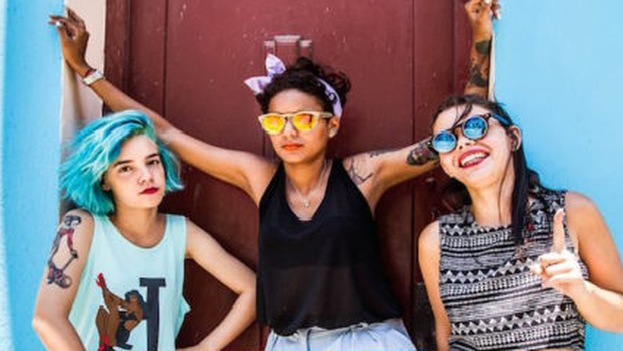![]() 14ymedio, Zunilda Mata, Havna, 28 March 2017 — A pirouette and life is turned upside down. Another and the wheels crash against the pavement leaving a mark in their path. Cuban women skaters defy gravity and machismo, two forces trying to make them fall. Their dreams are told in the documentary Sisters on Wheels by director Amberly Alene Ellis, currently in the United States.
14ymedio, Zunilda Mata, Havna, 28 March 2017 — A pirouette and life is turned upside down. Another and the wheels crash against the pavement leaving a mark in their path. Cuban women skaters defy gravity and machismo, two forces trying to make them fall. Their dreams are told in the documentary Sisters on Wheels by director Amberly Alene Ellis, currently in the United States.
The film looks at the phenomenon of skateboarders told from the experience of young Cuban women who practice a sport marked by prejudice. Not only must they deal with the animosity still provoked in some observers, but also with putting themselves in “a territory of men.”
The protagonists of Sisters on Wheels display the technical difficulties of practicing this discipline in Cuba, with few resources and places to skate for training. The young women talk about their struggle to have skateboarding recognized as a sport, far beyond an entertaining pastime.
The Amigo Skate project has helped alleviate the material hardships of some of these young women. The initiative asks, from its on-line site, for people to bring or send skateboarding equipment to the island, and facilitates events linked to the sport, in additional to concerts and the painting of murals.

Cuban-American René Lecour is part of the solidarity project and the director of Sisters on Wheels came to the reality of skateboarding through him. In a country where very few skateboards have been marketed and there are barely enough spare parts to fix a broken table, the practice becomes complicated. However, new technologies help, with videos and tutorials that teach spinning and other techniques.
Ellis, who traveled to the island initially to film material about women filmmakers, was attracted by the “innovation” she saw in these urban athletes and knew first hand about a similar phenomenon in her own country when “skateboarding pioneers, in the ‘80s, made their own boards with what they could find.”
“Without intending to, we moved from filmmaking to skating,” recalls the director, who believes skating becomes an act of protest for these young people in a nation where the government regulates every centimeter of reality, especially the sports scene.
The documentary, which began filming in 2015, uses skateboarding as a way to approach the national reality and in particular the changes that occurred after the thaw between the Governments of Cuba and the United States.
In the practice of skateboarding, the filmmaker sees a gesture of independence that “is seeking free expression”
